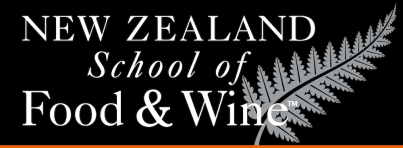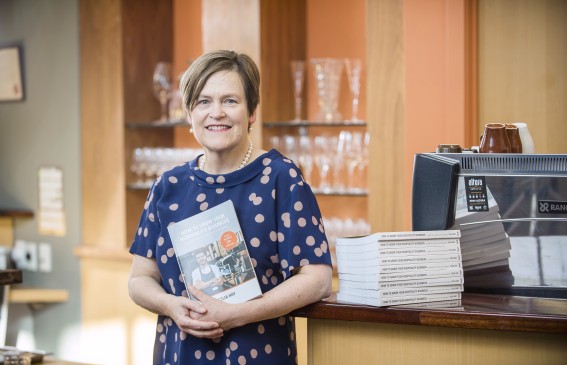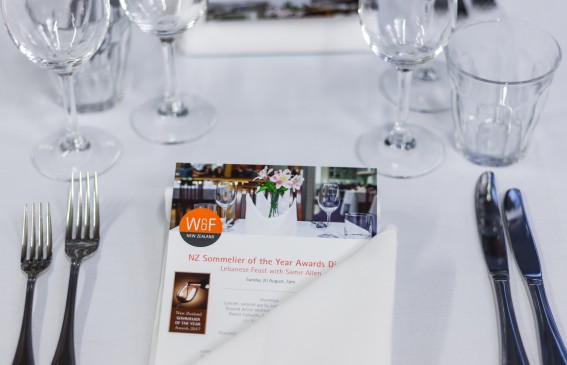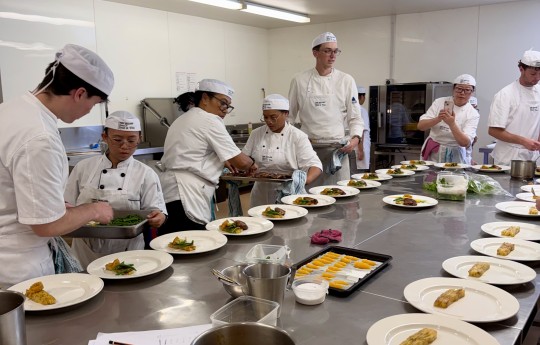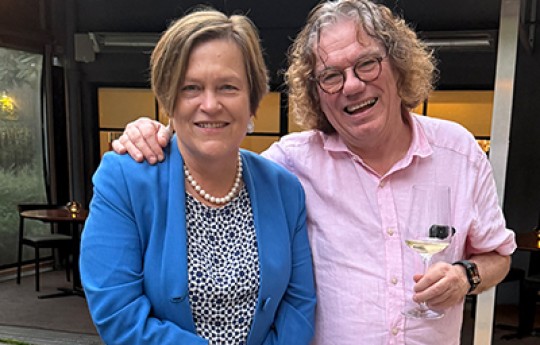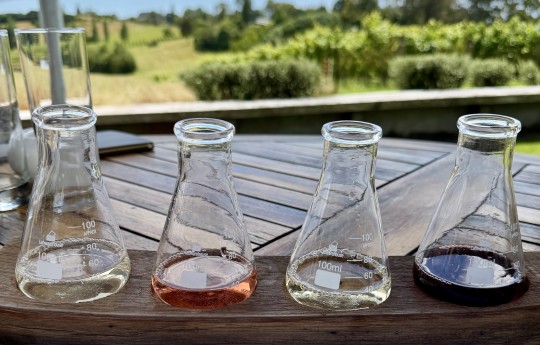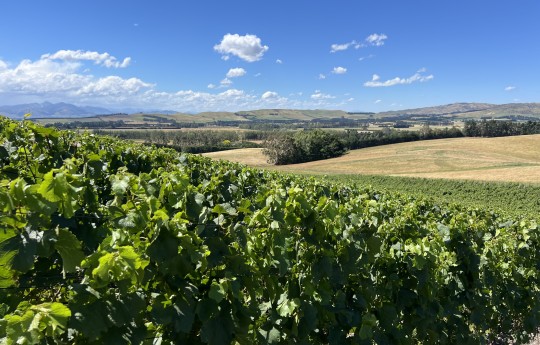Marco Polo: Food discovered on his travels
Around the 1280s, Marco Polo, while serving Khubilai Khan, the first Mongol Emperor of China, travelled across the empire and reported his observations back to the Great Khan.
Marco Polois a familiar name with a remarkable story, captured in the book The Travels, an account of his 24-year adventure, between 1271 and 1294. Starting off along the Silk Roads of Central Asia and to the court of Khubilai Khan, of the Yuan Dynasty, to regional China as the Great Khan's emissary, and sailing back via Southeast Asia to the Persian Gulf, 17 years later.
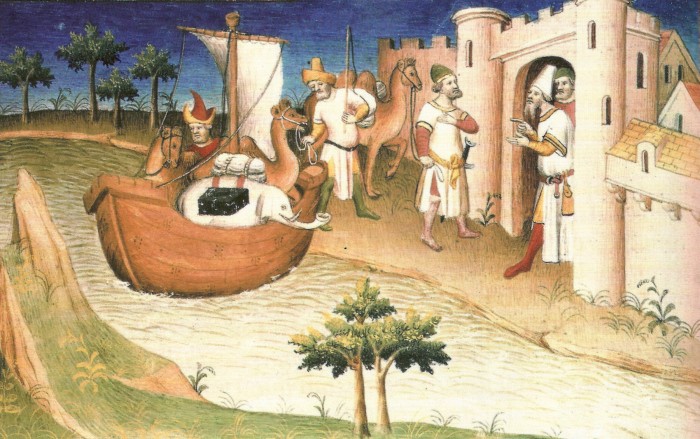
Marco Polo travelling, Miniature from the Book "The Travels of Marco Polo" ("Il milione"), originally published during Polo's lifetime (c.1254 - 1324), but frequently reprinted and translated. Public domain, via Wikimedia Commons
From a culinary perspective, Marco Polo offers a fascinating narrative of foods and drinks observed and tasted along the way, including meats, grains, valuable spices and local wines and alcoholic beverages. Nigel Cliff (2015), in his book Marco Polo, The Travels, provides a new translation of this classic book. Originally written in hybrid Franco-Italian, it was copied by hand into nearly every European language and dialect. Marco Polo remains a legend 600 years after his death in Venice.
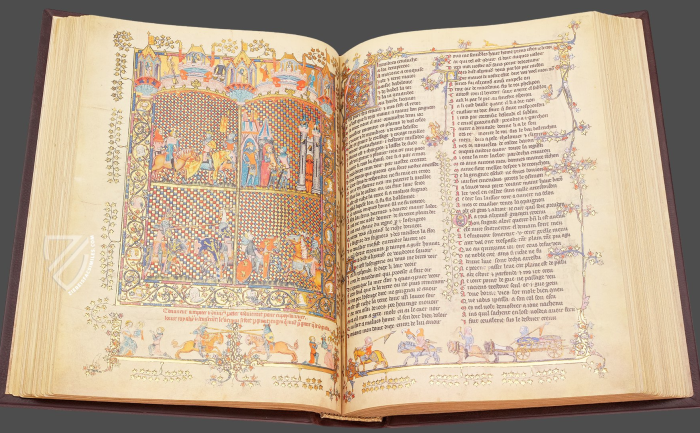
https://www.facsimiles.com/facsimiles/alexander-romance-the-travels-of-marco-polo
Marco Polo quotations on food and beverages
In this blog, I have included a series of Marco Polo quotations to illustrate his opinions. These are taken directly from Nigel Cliff’s translation, Marco Polo, The Travels (2015).
Near Hormuz, Persia
In the cities, there are many merchants and artisans who live by trade and industry, for they make gold and silk fabrics of every kind. Much cotton grows there. They have plenty of wheat, barley, millet, panic grass and every variety of grain as well as wine and all kinds of fruit. Someone may object that Saracens do not drink wine because their law forbids it.
My answer to this is that they gloss the text of the law to the effect that, if the wine is simmered over a fire until it is partly reduced and turns sweet, they are free to drink it without breaking their commandments or laws; for then they no longer call it wine, but rather change its name along with its taste. [p.33] This was known as boiled wine.
Taleqan, Iran
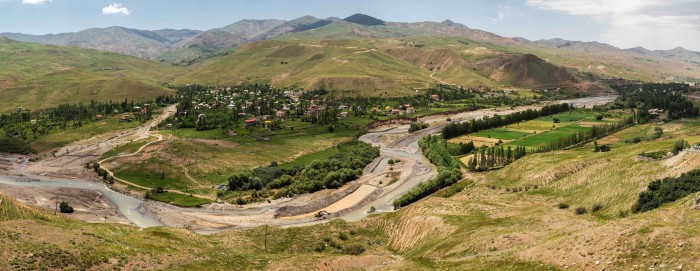
Amir Pashaei: Panorama of Taleqan (Jazan) in Iran, 2018
At the end of these 12 days, the traveller comes to a village called Taleqan where there is a great grain market. It is surrounded by very beautiful countryside, with huge mountains to the south that are made entirely of salt.
People come from all around travelling for as long as 30 days, to fetch the salt, which is the best in the world. It is so hard that it can only be extracted with a great iron pick; and I assure you there is so much of it that it could supply the entire world under the end of time. There are also mountains covered in almonds and pistachios, and a huge market in them is held here.
Leaving the city, the traveller continues for three days towards the east-north-east, passing through beautiful countryside with plenty of dwellings and a profusion of fruits, grain and vines. [p.47]
Badakhshan, Afghanistan
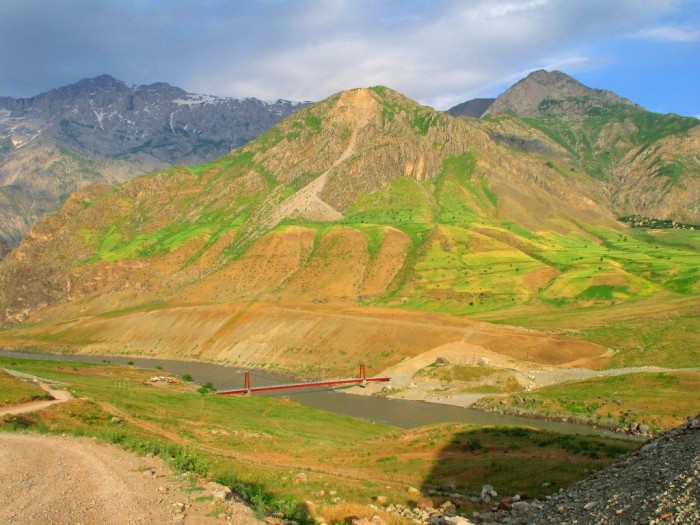
Khwahan, CC BY-SA 3.0 <https://creativecommons.org/licenses/by-sa/3.0>, via Wikimedia Commons
Badakhshan is a province whose people worship Muhammad and they have their own language. It is a large kingdom, at least 12 days’ journey long, and is ruled by hereditary kings. The royal line descends from King Alexander and the daughter of King Darius, the great Lord of Persia...
It is very cold in this country and province. And you should also know that excellent horses are bred there; they are great runners and are never shod with iron and are in constant use in the mountains...
There are abundance stocks of game, both beasts and birds, and of wild sheep. The sheep sometimes roam and flocks of 400, 500 or 600; however many are taken, their numbers are never depleted. They have good wheat and barley without a husk. They have no olive oil, but they make oil from sesame seeds and nuts. [p.49]
Moreover, at the top there are broad plateaux where grass and trees grow thickly and great springs of the purest water that gush like rivers over the rocks and into the valley below. The streams are well stocked with trout and other choice fish.
On the mountain tops the air is so pure and so wholesome that if a man living in a city or house in the adjoining valleys falls ill with a fever… he has only to head up into the mountains and two or three days rest will banish the sickness and restore him to good health.
And Messer Marco vouchers for this from his own experience. [p.50]
Wakhan, Hindu Kush
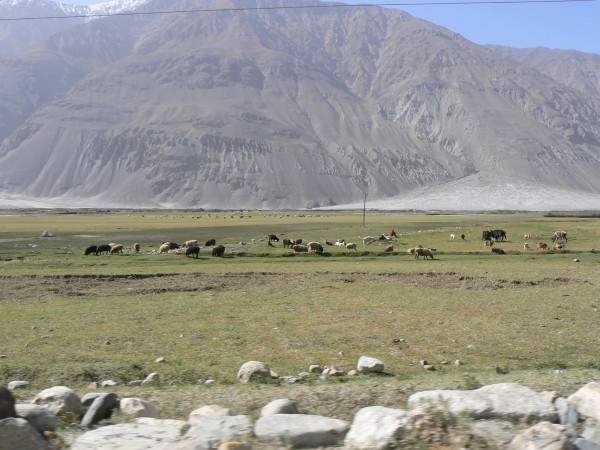
Benpaarmann, CC BY 2.0 <https://creativecommons.org/licenses/by/2.0>, via Wikimedia Commons
Leaving this place, the traveller heads for three days towards the north-east across a series of mountains, climbing so high that it is said this is the most elevated place in the world. When he reaches these heights, he finds a plain between two mountains and a great lake that feeds a very fine river.
This plain provides the best pasture in the world; a lean beast will grow fat here in ten days. Every kind of wild beast is found here in huge numbers. There are vast flocks of wild sheep of prodigious size, with horns a good six palms and length… from which the shepherds make large vessels that they serve as eating bowls. [p.52]
Genghis Khan, c1162-1227
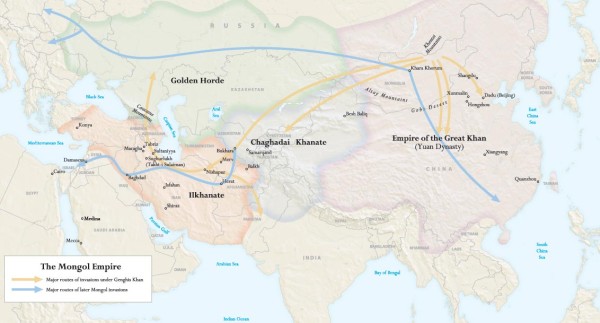
Los Angeles County Museum of Art, Public domain, via Wikimedia Commons
Now it happened in the year 1187 that’s the Tartars [Marco Polo uses this word for the Mongols] chose a king to reign over them whose name and their language was Genghis Khan. He was a man of great courage, great wisdom and great progress.
Moreover, let me tell you that when this man was chosen as king all the Tartars in the world, scattered though they were through various foreign countries, came to him and acknowledged him as their lord. And this Genghis Khan exercised power capably and honourably.
What else shall I tell you?
Such vast numbers of Tartars rallied to him that it was beyond belief. And when Genghis Khan saw how many followers he had, he equipped them with bows and other weapons and went conquering through other lands…
And when Genghis Khan had a massed such a multitude of followers that they covered the face of the earth, he made up his mind to conquer a great part of the world. [p.66]
Mongol Warriors
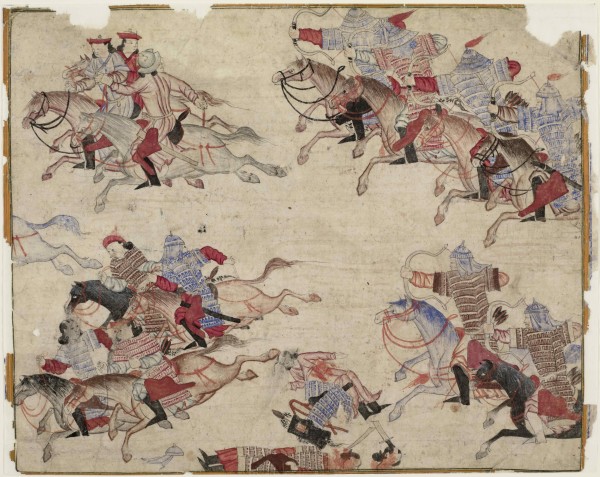
14th century depiction of Mongol warriors on horseback pursuing enemies, Public domain, via Wikimedia Commons
And I will tell you how it is that they can endure more than any other men. For when necessary, as it often is, and whether they are on the march or stationed in one place, they will go for a month without food except for the milk of a mare and whatever game they can catch.
And their horses likewise graze is on grass they find, so they do not need to carry barley or straw. They are very obedient to their Lords, and I assure you that when necessary they will stay on horseback all night long, the men fully armed and their horses steadily cropping the grass.
Of all the men in the world they are the best able to endure fatigue and hardship and the least costly to maintain and therefore the best adapted for conquering lands and kingdoms.[p.72]
They have trained their horses to wheel this way or that is nimbly as a dog. If they are put to the chase and retreat at full tilt, they fight as adroitly and as fearlessly as when they are face-to-face with the enemy.[74]
Milk from Horses
Koumiss is made by fermenting raw horse milk at around 27°C for 2 to 5 hours, lactobacilli bacteria acidify the milk, and yeasts turn it into light, mildly tart, carbonated beverage of 1 – 2.5% alcohol.[1]
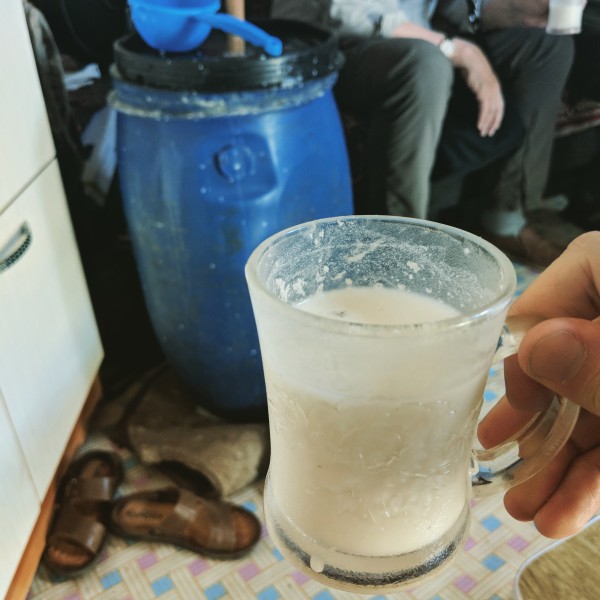
Jpatokal, CC BY-SA 4.0 https://creativecommons.org/licenses/by-sa/4.0 via Wikimedia Commons
You should know that they drink mare’s milk, but let me add that they prepare it in such a way that it resembles white wine; it is a delicious drink, and they call it koumiss. [p.72]
When they are going on a long campaign, they carry no baggage with them. Each man takes two leather flasks to hold milk he drinks and a small earthenware pot for cooking meat.
If he lacks this, he will find and kill an animal, take out and empty its belly, and fill it with water: having cut the meat he wishes to cook into pieces he will put it inside this water filled belly then hang it over a fire and let it cook; when it is ready, he will eat the meal, pot and all.
Each man takes a small tent to shelter from the rain. I will tell you another thing, too: when necessary, they will ride for as long as 10 days without eating or making a fire and living only on the blood of their horses, each piercing one of his horses’ veins and drinking the blood.
Dried Mare's Milk
They also have dried milk, which is solid like a paste. It is dried like this: they boil the milk and skim the cream off the top, putting it in another vessel to make butter, because the milk cannot be dried while it floats on top. Then the milk is put out in the sun to dry.
And when they go to war, they each carry about 10 pounds of this milk. In the mornings they each take half a pound of the milk and mix it with water in a little leather flask shaped like a bottle, which they keep with them as they ride until the milk has been shaken up and has dissolved into a syrup. Then they drink it for breakfast.[2]
Every Lord or other owner of herds or flocks, including horses, mares, camels, oxen, cows and other large beasts, has them branded with his own mark; then they let loose to graze on the plains and hillsides without a herder to watch them. If they get mixed up, each animal is duly returned to the owner whose market bears.
Rams, sheep and goats, though, are attended by sheppards. The cattle are all very big and fat and exceptionally fine. [p.75]
Xanadu Shangdu – Summer Palace of Khubilai Khan
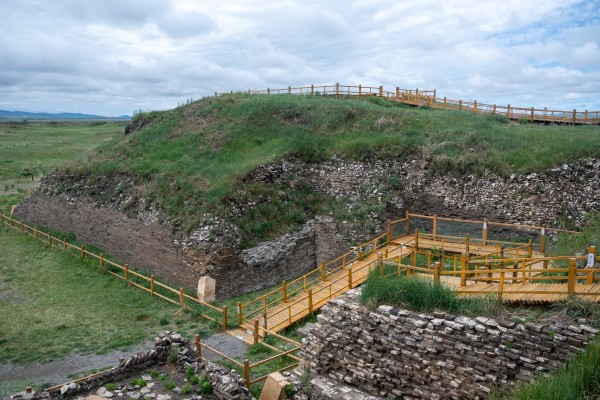
Xquinhosilva, CC BY 2.0 via Wikimedia Commons The Site of Xanadu, a UNESCO World Heritage Site in Inner Mongolia, China, encompasses the ruins of Kublai Khan’s legendary summer capital of the Yuan Dynasty, designed in 1256
And in this city Khubilai Khan [grandson of Genghis Khan] had a vast palace built of marble and other ornamental stones. Its halls and rooms are covered with gilded images of birds and animals, trees and flowers and many other things, so skilfully and ingeniously worked that is a delight and wonder to see…
Here the Great Khan keeps all kinds of animals, such as harts, stags and roebuck, to provide food for the gerfalcons that he keeps… [p.81]
Millet and Rice
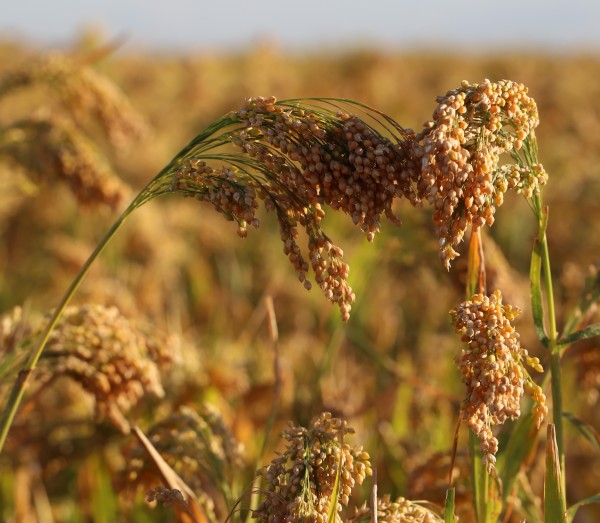
Jschnable, CC BY 4.0 https://creativecommons.org/licenses/by/4.0, via Wikimedia Commons
With regard to food, they have plenty, because they mainly eat rice or millet, particularly the Tartars, the Cathayans [China] and the people of the province of Manzi [Southeast China]. And in these countries the yield of these grains is 100 times the volume of seed sown.
The people do not eat bread, but simply boil these three kinds of grain with milk or meat and eat them. Wheat does not give such a great yield in their country; but what they reap they eat only as lasagne and other pasta dishes.
No land of theirs that can be ploughed lies fallow; their animals increase and multiply without end, and when they go campaigning there is not one who does not take with him six, eight or more horses for his own use. So it is not hard to understand why the populations in these parts are so vast and the means of life so abundant. [p.129]
Wine from Rice
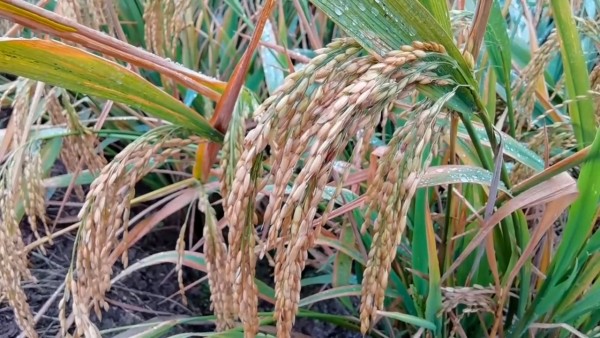
中国新闻网, CC BY 3.0 https://creativecommons.org/licenses/by/3.0 via Wikimedia Commons
You should also know that most of the inhabitants of the province of Cathay drink wine of a kind I will describe to you.
They make a beverage of rice mixed with many choice spices, prepared in such a manner and with such expertise that it tastes better than wine. It is crystal clear and delicious, and it makes a man drunk more quickly than any other wine because it is very fiery.[p.134]
Spices - Jiandu (Xichang in Sichan)
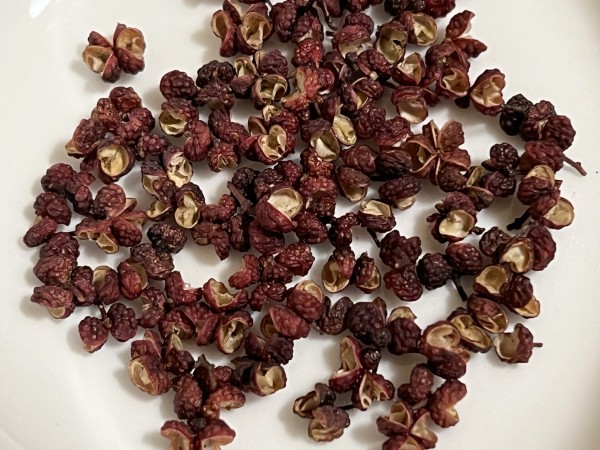
Sichuan Pepper Matt K, https://creativecommons.org/licenses/by-sa/4.0 via Wikimedia Commons
Cloves grow plentifully in this province; they come from a little tree with leaves like a laurel but somewhat longer and narrower. It bears small white flowers like our carnations.They also have a great deal of ginger, as well as cinnamon and many other spices that never reach our part of the world and so are not worth mentioning. [p.156]
One of these spices must be Sichuan Pepper, dried outer shell of the Zanthoxylum fruit.
Kingdom of QARAJANG (Yunnan province)
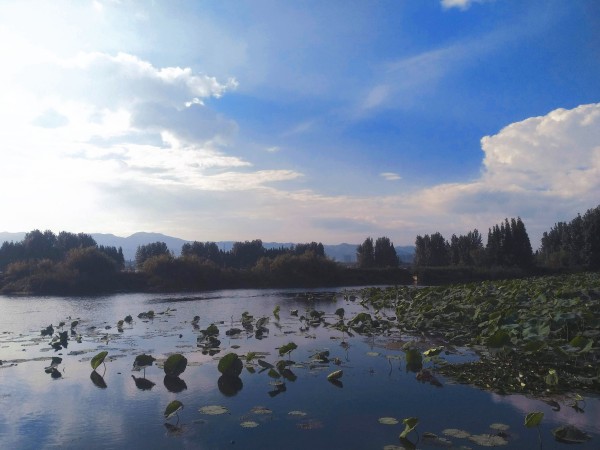
Lake Dianchi, Yunnan, RoyalCathayan, Wikimedia Commons
But first I will tell you something that slipped my mind. I can tell you that they have a lake a good hundred miles in circumference in which enormous quantities of the finest fish in the world are found. There are many different varieties, all huge.
People eat raw flesh of poutry, sheep, oxen, buffalo
Then I can also tell you that people eat the raw flesh of poultry, sheep, oxen and buffalo; for the poor go to the butchers and take the raw liver as soon as it is drawn from the animal and chop it into pieces. Then they put it in a garlic sauce and eat it straight away. And they do the same with every other meat.
The gentlemen all eat raw meat too, but they have it finely minced and then put it in the garlic sauce mixed with choice spices, which they eat it with as much pleasure as we do cooked meat. [p.158]
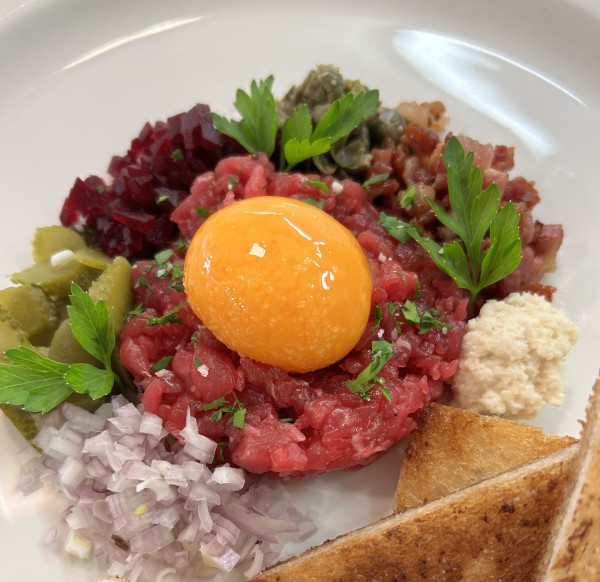
Steak Tartare prepared at the New Zealand School of Food and Wine
See Reciple and read here more about Marco Polo and Steak Tartare.
Sugar, a sweet, fine spice
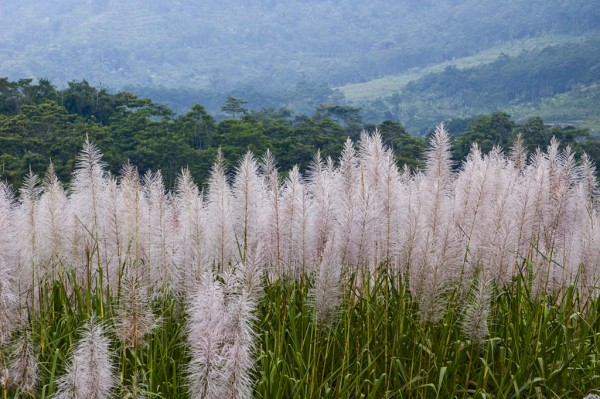
Tanti Ruwani, CC BY 2.0 https://creativecommons.org/licenses/by/2.0, via Wikimedia Commons
…a city called Houguan [today Minhou, near the city of Fuzhou on the east coast of China, opposite Taiwan] that produces a vast amount of sugar. Indeed all the sugar consumed in the great Khan‘s court comes from this city, the quantity being so great that it is worth a small fortune.
But you should know that before the Great Khan conquered them, the people of these parts did not have the expertise to prepare and refine sugar on a par with that produced in Egypt. Instead of putting it in moulds to sit and solidify, they merely boiled and skimmed it until it was reduced to a black paste.
When the country fell under the Great Khan‘s rule, though, some Egyptians who were at the court came here and taught them how to refine it with the ashes of certain trees. There is nothing else worth mentioning so we will continue on our way. [p.217]
Fuzhou, East coast of China
Sugar is also produced here in indescribable quantities. A roaring trade is done in pearls and other precious stones, because many ships come here from India bringing large parties of merchants who traffic in the Indian islands.
I should add that the city of Fuzhou is six days' journey from the port of Zayton [Quanzhou on Taiwan Strait] on the Ocean Sea, where many ships from India put in carrying large cargoes before heading up the great river I mentioned above as far as the city of Fuzhou. And this is how many precious goods arrive here from India.
They have everything needed to nourish the human body in great abundance. There are beautiful, mouthwatering gardens full of fine fruit. To put it simply it is such a fine city and so well ordered in every respect that it is marvellous beyond words. [p.219]
Spice Trade
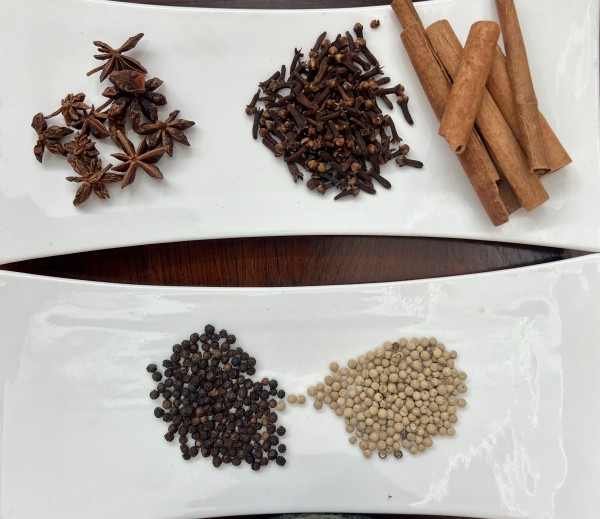
L-R: Star Anise, Cloves, Cinnamon, Black Pepper, White Pepper
You should know that a traveller who sails 1500 miles from Champa [Central Vietnam] in a south-south-easterly direction comes to a very large island called Java.
According to veterans sailors who know it well, this is the largest island in the world; in fact it is more than 3000 miles in circumference. It belongs to a powerful king, and the people are idolaters [Hindu] and pay tribute to no man on earth.
This island is enormously rich. They have pepper and nutmeg and spikenard [flowering plant in honeysuckle family] and galangal and cubebs [dried berries, similar in appearance to black pepper, but with stalks attached] and cloves and all the precious spices that can be found in the world.
It is visited by a great number of ships and merchants who buy many goods and make great profits and handsome returns. There is so much treasure in this island that there is not a man in the world who could appraise or describe it.
Moreover, I can tell you that the Great Khan has never been able to conquer it, on account of the long and perilous voyage that must be made in order to get there. [p.235]
And that will do. Thank you Marco Polo!
Celia Hay, 3/10/2025
End Notes
[1] Magee, H., On Food and Cooking., p. 46
[2] Cliff, N. Footnote p 373: each man has about 18 horses and mares to allow for frequent changes of mount.
References
Cliff, N., (2015). Marco Polo, The Travels, Penguin Books, UK
McLynn, F., (2016). Genghis Khan, The Man Who Conquered the World. UK
McGee, H., (2004) On Food and Cooking, An enclylopedia of Kitchen Science, History and Culture, Hodder & Stoughton, UK
Weatherford, J., (2024) Emperor of the Seas: Kublai Khan and the Making of China, Bloomsbury, UK
